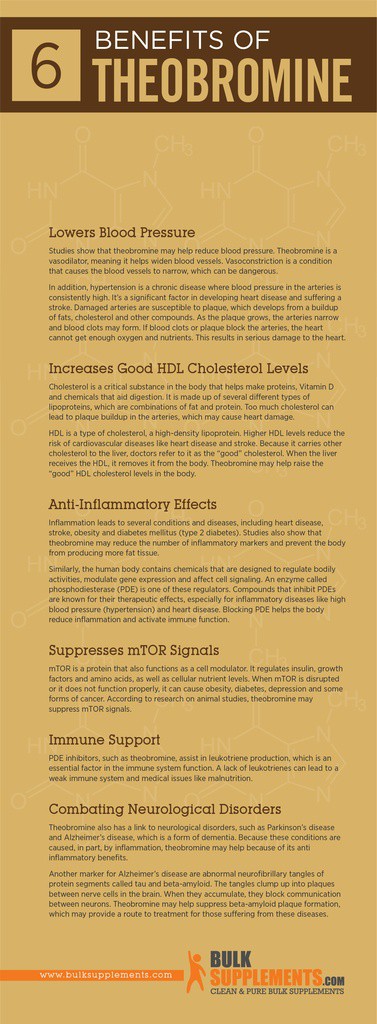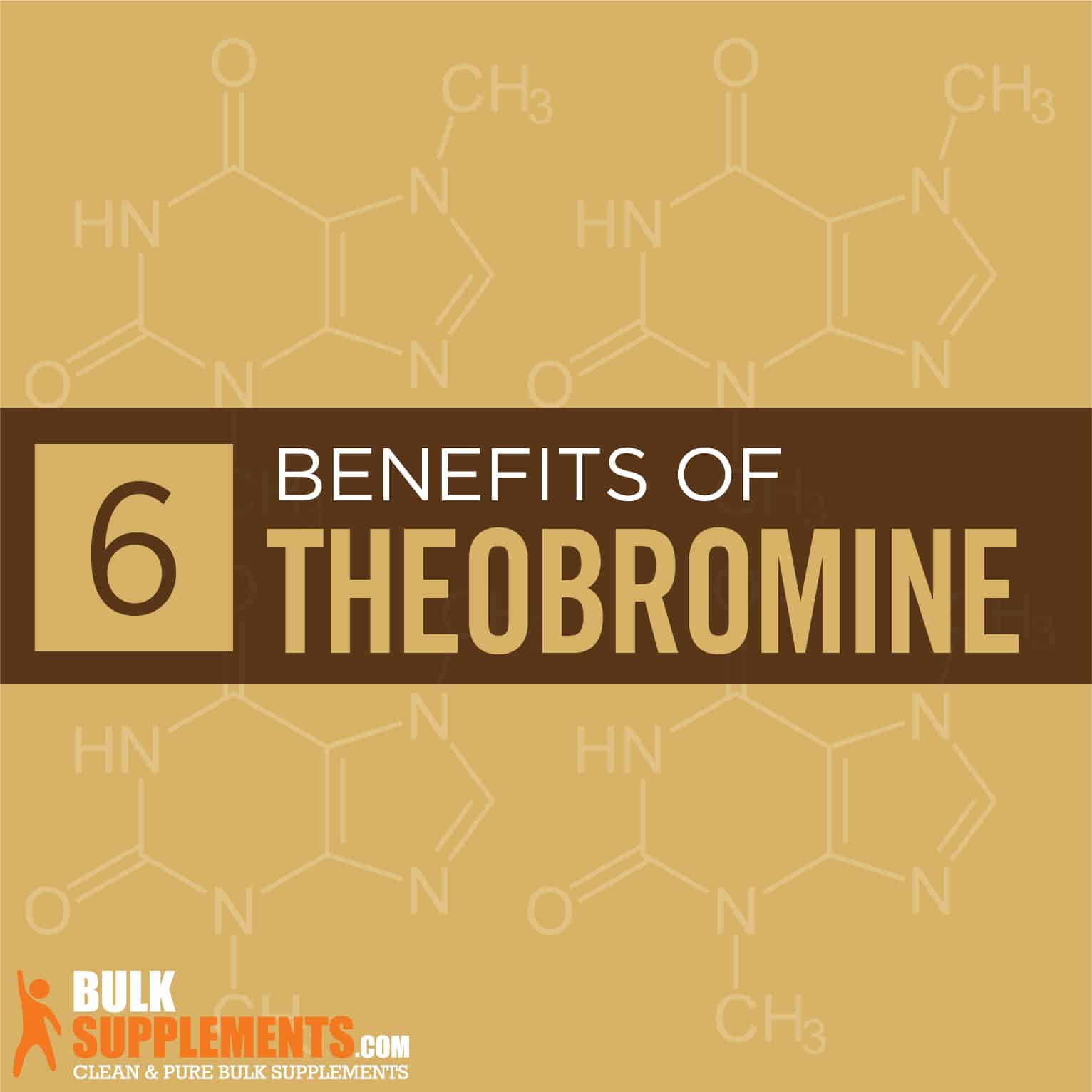What is Theobromine?
Theobromine is an organic compound that comes from the cacao plant. Formerly known as xantheose, it is also present in chocolate, cocoa powder, kola nuts and tea leaves and it has effects on the body similar to caffeine. The liver breaks down caffeine into three different chemicals and theobromine is one of them. Theobromine and caffeine are both xanthines, which are specific molecules with different properties that benefit overall health (x).
Human bodies contain adenosine receptors, which regulate the release of neurotransmitters and oxygen and blood flow in the heart. Xanthines are called “adenosine antagonists.” They bind to the receptors and block their functioning, rather than activating them. Additionally, this process is useful for stimulating the heart (x).
Theobromine vs. Caffeine
Chemically, the two molecules are similar. However, caffeine has one more methyl group than theobromine (a carbon atom with three hydrogen atoms). This extra methyl group makes it easier for caffeine to cross the blood-brain barrier, which prevents pathogens and other blood invaders from entering the brain.
Caffeine affects the central nervous system,while theobromine affects the “smooth muscle” found in the walls of the stomach, intestines, bladder and arteries (x). Also, stimulation from theobromine is usually milder than caffeine stimulation. Moderate doses of theobromine can enhance the mood and brain effects that caffeine causes without the adverse side effects (x). However, too much theobromine can increase heart rate (x). Derivatives of theobromine and caffeine also show potential for treating ovarian cancer by inducing apoptosis, a process that destroys cancer cells (x).
Benefits of Theobromine
Lowers Blood Pressure
Studies show that theobromine may help reduce blood pressure (x). Theobromine is a vasodilator, meaning it helps widen blood vessels. Vasoconstriction is a condition that causes the blood vessels to narrow, which can be dangerous (x).
In addition, hypertension is a chronic disease where blood pressure in the arteries is consistently high. It’s a significant factor in developing heart disease and suffering a stroke. Damaged arteries are susceptible to plaque, which develops from a buildup of fats, cholesterol and other compounds (x). As the plaque grows, the arteries narrow and blood clots may form. If blood clots or plaque block the arteries, the heart cannot get enough oxygen and nutrients. This results in serious damage to the heart.
High blood pressure can also lead to kidney disease, vision loss and a impaired cognitive function (x, x, x). Reducing blood pressure is essential for heart health and can significantly decrease the risk of stroke and heart attack (x).
Increases Good HDL Cholesterol Levels
Cholesterol is a critical substance in the body that helps make proteins, Vitamin D and chemicals that aid digestion. It is made up of several different types of lipoproteins, which are combinations of fat and protein. Too much cholesterol can lead to plaque buildup in the arteries, which may cause heart damage (x).
HDL is a type of cholesterol, a high-density lipoprotein. Higher HDL levels reduce the risk of cardiovascular diseases like heart disease and stroke (x). Because it carries other cholesterol to the liver, doctors refer to it as the “good” cholesterol. When the liver receives the HDL, it removes it from the body. Theobromine may help raise the “good” HDL cholesterol levels in the body (x).
Anti-Inflammatory Effects
Inflammation leads to several conditions and diseases, including heart disease, stroke, obesity and diabetes mellitus (type 2 diabetes) (x, x, x, x). Studies also show that theobromine may reduce the number of inflammatory markers and prevent the body from producing more fat tissue (x).
Similarly, the human body contains chemicals that are designed to regulate bodily activities, modulate gene expression and affect cell signaling. An enzyme called phosphodiesterase (PDE) is one of these regulators. Compounds that inhibit PDEs are known for their therapeutic effects, especially for inflammatory diseases like high blood pressure (hypertension) and heart disease. Blocking PDE helps the body reduce inflammation and activate immune function (x).
Theobromine is a non-selective phosphodiesterase (PDE) inhibitor, meaning it can prevent PDE from forming (x, x). PDE inhibitors may provide a potential tool to help manage inflammation (x). In combination with other phytonutrients (like caffeine and catechin), theobromine helps reduce bodily inflammation that can develop with a specific effective antipsychotic medicine (x).
Suppresses mTOR Signals
mTOR is a protein that also functions as a cell modulator. It regulates insulin, growth factors and amino acids, as well as cellular nutrient levels (x). When mTOR is disrupted or it does not function properly, it can cause obesity, diabetes, depression and some forms of cancer (x, x, x). According to research on animal studies, theobromine may suppress mTOR signals (x).
Immune Support
PDE inhibitors, such as theobromine, assist in leukotriene production, which is an essential factor in the immune system function. A lack of leukotrienes can lead to a weak immune system and medical issues like malnutrition.
Combating Neurological Disorders
Theobromine also has a link to neurological disorders, such as Parkinson’s disease and Alzheimer’s disease, which is a form of dementia. Because these conditions are caused, in part, by inflammation, theobromine may help because of its anti inflammatory benefits (x, x).
Another marker for Alzheimer’s disease are abnormal neurofibrillary tangles of protein segments called tau and beta-amyloid. The tangles clump up into plaques between nerve cells in the brain. When they accumulate, they block communication between neurons (x). Theobromine may help suppress beta-amyloid plaque formation, which may provide a route to treatment for those suffering from these diseases (x).
Other Benefits of Theobromine
Theobromine may also act as a mild stimulant and help patients process visual information more effectively. It may also improve focus and concentration (x).
Studies have also suggested that theobromine may remineralize tooth enamel, making it harder and making the teeth stronger (x). However, disappointing as it may be, eating chocolate does not promote stronger tooth enamel.
Theobromine may also benefit the skin. The supplement and foods that contain theobromine may improve skin health. According to studies, dark chocolate can help the skin recover from sun damage and help prevent wrinkles by improving hydration and skin density (x).

Side Effects of Theobromine
Eating products with theobromine as well as supplements are generally safe for most patients. But because it has properties of a stimulant, theobromine may cause side effects similar to caffeine, such as nervousness, sleeplessness, frequent urination and increased heart rate. It may also cause headaches, nausea, gas and loss of appetite. Topicals may cause side effects on the skin. For example, cocoa butter, a derivative of theobromine, may cause a rash (x).
Dosages
As a supplement, the recommended daily allowance of theobromine is 250 to 500 mg daily. Do not exceed the maximum dosage in one day and use an accurate milligram scale to properly weigh the supplement.
The Bottom Line
Theobromine is an organic compound that comes from the cacao plant. It produces effects similar to caffeine. The chemical may help regulate blood pressure, support the immune system and remineralize tooth enamel. It also has antioxidant and anti inflammatory characteristics that may help prevent health conditions like diabetes, Alzheimer’s and Parkinson’s. It may also help the skin recover from sun damage and keep the skin hydrated to prevent signs of aging.
The recommended daily allowance of theobromine is 250 to 500 mg daily. It is important to follow the recommended dosage and avoid exceeding the maximum amount of 500 mg. Although it may have health benefits, theobromine is not an acceptable medical treatment. Always follow professional medical advice and consult with a doctor before adding a supplement to your dietary regimen.


